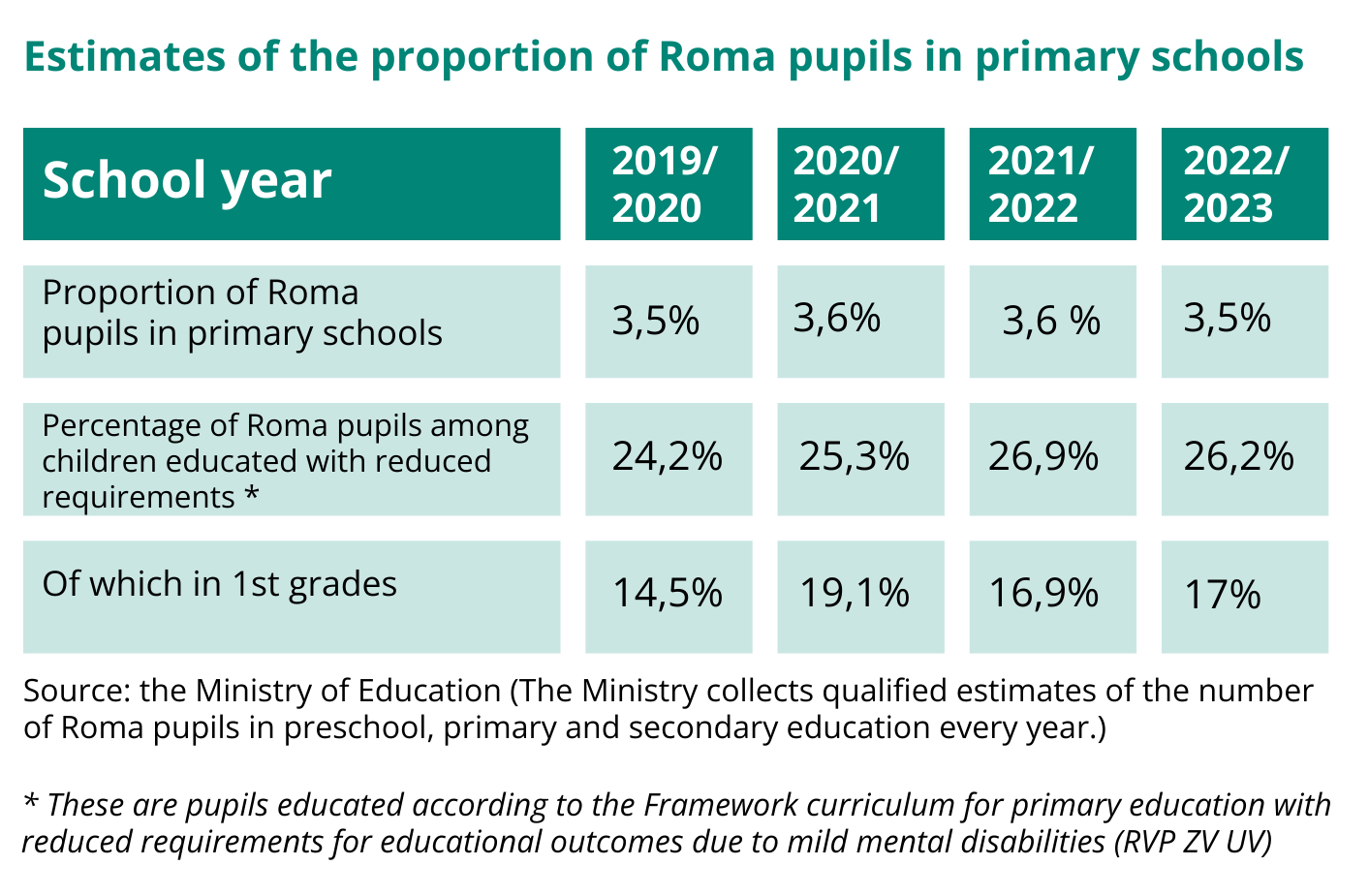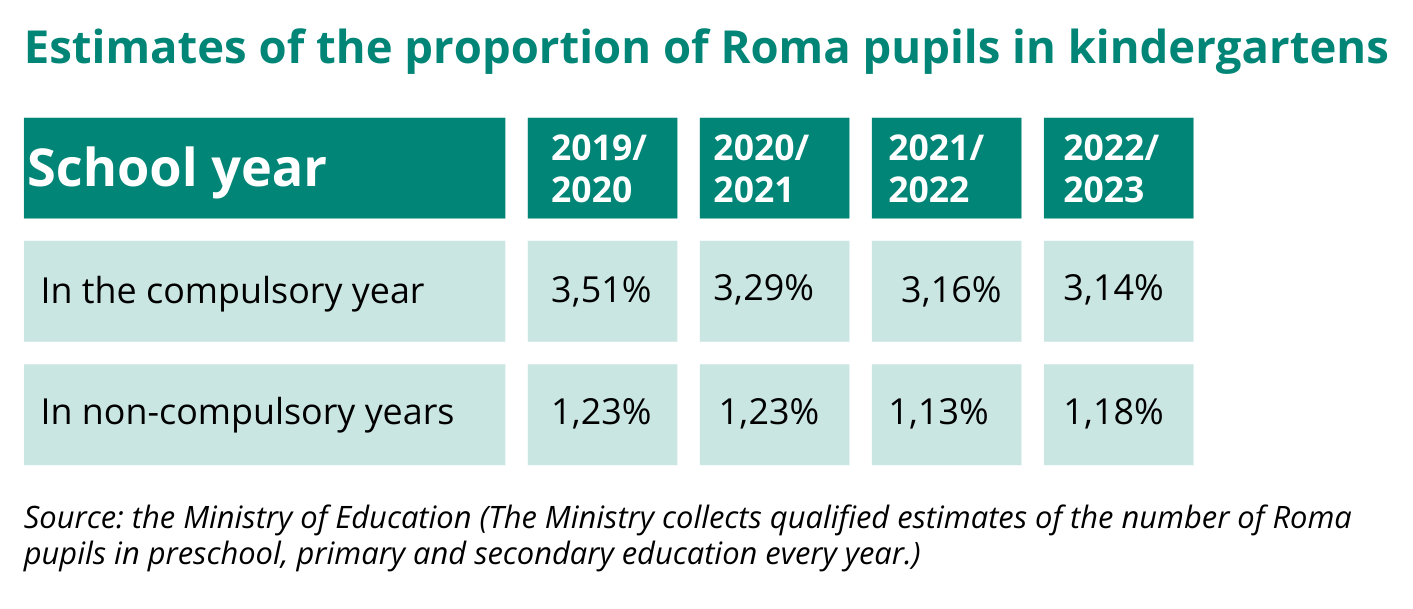Published on November 6, 2023
According to educational plans designed for pupils with mild mental disabilities more Romani children are still being taught than would correspond to the representation of Roma among all schoolchildren
As in previous years, current data from the Czech Ministry of Education show that Romani pupils are roughly 10 times more likely to leave psychological counseling centres with a diagnosis of mild mental disability than their non-Romani classmates. According to the Ombudsman, in the three years when he has been monitoring this topic, the situation in Romani education has not improved much. On average 3.5% of primary school pupils are of Roma origin. However, over a quarter (26.2%) of pupils educated according to the rules with reduced requirements, designed specifically for children with mild mental disabilities, are Roma. Such a disproportion raises questions about whether equal treatment of Roma in access to and provision of education is ensured.
The Ombudsman warned already last year, that pedagogical-psychological counseling centers often fail to recognize the difference between mild mental disability and social disadvantage of children due to outdated diagnostics. The consequences of the complicated social background of Romani children can thus be misinterpreted by psychologists and special educators as mental disability. This has a major impact not only on the education of these children, but above all on their future employment and their lives in general.
According to the Ombudsman, the situation could be improved by using more appropriate diagnostic tools that can better detect the possible impact of social disadvantage. These include tests that focus on mapping child's cognitive processes or tests tracking the development of child's abilities over time, rather than comparing the results to a predetermined scale of assessments. However, available information suggests that the replacement of outdated diagnostic tools by more modern ones is slow.

The Ombudsman monitors preschool education for Romani children as well, because kindergartens can help children to compensate for the disadvantages of the environment. However, the proportion of Roma children in the non-compulsory years of kindergartens is still low and even decreasing in the compulsory years.

Although the situation in the education of Romani pupils has not changed in many respects, the Ombudsman acknowledged as a great success the completion of extensive research focused on the impact of compulsory year of preschool education on the education of Romani pupils. In this research, the authors of the study in socially excluded localities, among other things, investigated the main reasons for the non-participation of Romani children in preschool education. Because the parents themselves did not attend kindergartens, they have no idea about their advantages and therefore often do not enlist their children there either. Some parents did not know that children of unemployed parents can also attend kindergartens. Last but not least, in addition to the lack of kindergartens close to home, the insufficient capacity of kindergartens also plays a role.
The Ombudsman monitors the implementation of the right to equal treatment and protection against discrimination in several areas thanks to the Norway Grants project "Reinforcing the activities of the Public Defender of Rights in the protection of human rights"[1]. In the monitoring reports, he provides information on the development of the monitored indicators of the level of equal treatment in the field of education of Roma children and two other monitored areas - equal pay for women and men and procedural issues.
The final monitoring report will follow now. The Ombudsman will summarise developments in the areas monitored over the entire period of 2020-2023 and add recommendations on what measures should be taken to improve the implementation of the right to equal treatment in the areas concerned.
[1] Reinforcing the activities of the Public Defender of Rights in the protection of human rights (with the aim of establishing a National Human Rights Institution in the Czech Republic), No. LP-PDP3-001. The project is part of Human Rights Programme financed from the Norway grants 2014-2021 through the Czech Ministry of Finance.
- Press Release - The Equal Treatment Monitoring - 2022
- Monitoring report 2022
- Monitoring report 2021
- Monitoring report 2020
- Ombudswoman's recommendations on compulsory pre-school education (2019 - Czech only)
- Ombudswoman's recommendations on joint education of Roma and non-Roma children (2018)
- Ombudswoman's recommendations on equal access to pre-school education (2018)
- Ombudsman's research on the ethnic composition of pupils in former special schools (2012 - Czech only)
